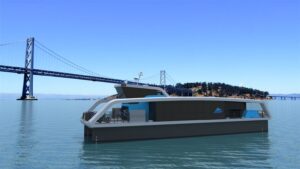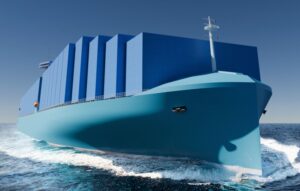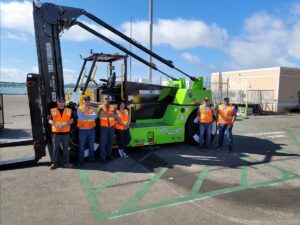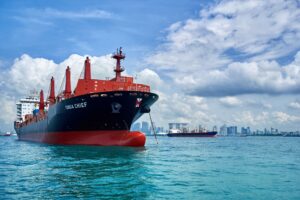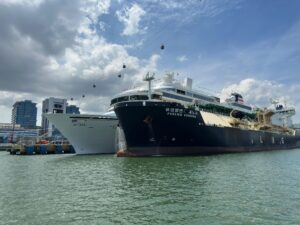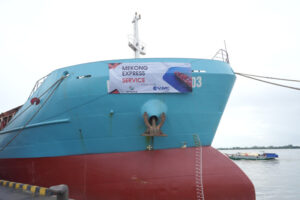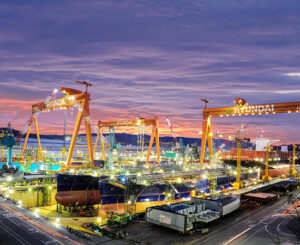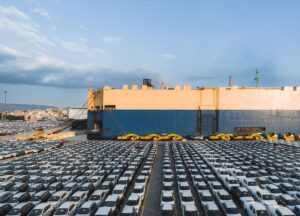MCS Hospital Ship Departs Naval Station San Diego for Humanitarian Mission
Military Sealift Command hospital ship USNS Mercy (T-AH 19) departed Naval Station San Diego May 3, beginning its part in Pacific Partnership 2012, a four-and-a-half month humanitarian and civic assistance mission to Indonesia, the Philippines, Vietnam and Cambodia. Mercy is crewed by 70 civil service mariners working for MSC who operate and navigate the ship while Navy planners and medical personnel plan and execute the mission.
Mercy was scheduled to depart May 1, but a mechanical problem delayed the ship’s departure for two days.
Pacific Partnership 2012 is a mission that will take medical, dental, veterinary, engineering and civic assistance projects to Southeast Asia and Oceania. Pacific Partnership missions build on relationships that have been developed during previous missions, for example Mercy’s participation in international relief efforts following the December 2004 tsunami that struck Southeast Asia, and Mercy’s 2006, 2008 and 2010 humanitarian and civic assistance deployments to the region.
Pacific Partnership 2012 is led by three different element commanders: Navy Capt. James Morgan, mission commander for Pacific Partnership 2012 and commander of San Diego-based Destroyer Squadron Seven; Navy Capt. Timothy Hinman, commander of the medical treatment facility, who is responsible for the hospital and providing medical care aboard Mercy and ashore; and Capt. Jonathan Olmsted, Mercy’s civil service master who has overall responsibility for the ship and the safety of its nearly 1,000 passengers.
“Having participated in Pacific Partnership 2009, I know firsthand what an impact we have on the local populations we visit,” said Olmsted. “In building these relationships, we’ll have a better understanding of how multiple militaries and civilian organizations can work together to overcome the adversity of a natural disaster.”
Throughout the 2012 Pacific Partnership mission, the 894-foot Mercy will serve as a platform from which U.S. and partner nation militaries and non-governmental organizations will coordinate and carry out humanitarian and civic activities in each country. Japanese landing ship tank Oosumi (LST 4001), carrying a complete medical team, helicopters and representatives from Japanese volunteer organizations, will join Mercy during its stops in the Philippines and Vietnam.
MSC’s civil service mariners are vital to the mission’s success. They navigate the ship to each mission stop and provide the freshwater and electricity needed to run the shipboard hospital and to support the mission personnel living and working aboard.
In addition, the civil service mariners play a critical role in mission success by operating two 33-foot utility boats to transport patients and mission personnel between ship’s anchorage and shore. Mercy is too large to pull pierside at any of the mission stops. The operation of these small boats, which can carry more than twice as many passengers as Mercy’s two embarked helicopters, will greatly increase the number of people who will benefit from the mission.
“This is the biggest thing I’ve ever been involved in my life,” said Second Officer Casey Bell, an MSC civil service mariner working aboard Mercy as the cargo mate. “I’m really excited to get going. I’ve spent my career moving ammunition or fuel; now a better name for me is ‘patient mate,’ because I’ll be working to safely move patients and personnel to and from the ship.”
The deployment will also foster new relationships when Mercy stops in three Indonesian islands for the first time in early June.
“I am really looking forward to going beyond what we have done in the past as part of our exchanges,” said Hinman about the medical capabilities of the mission. For previous missions, surgeries were traditionally performed by U.S. and partner nation providers aboard Mercy. “This year’s mission provides opportunities to integrate host nation providers into performing surgeries, both on the ship and ashore, as a true exchange of expertise and practice that will greatly increase medical capacity and build relationships.”
The mission will include personnel from all branches of the U.S. military; U.S. departments of State and Justice; the Agency for International Development; the National Oceanic and Atmospheric Association; 12 partner nations; 11 NGOs and numerous in-country organizations.
MSC operates approximately 110 noncombatant, civilian-crewed ships that strategically preposition combat cargo at sea around the world, move military cargo and supplies used by deployed U.S. forces, conduct specialized missions and replenish U.S. Navy ships at sea.
[mappress]
Source: Navy, May 7, 2012


